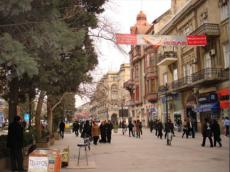|
|
TODAY.AZ / Society
ILO reports Azerbaijan on top for middle class size in South Caucasus
06 June 2013 [08:15] - TODAY.AZ
 Source: AzerNews
Source: AzerNewsAzerbaijan leaves behind the other two South Caucasus countries for the size of the middle class population, according to an International Labour Organization (ILO) report.
The annual report on the state of labor markets worldwide, the "World of Work Report 2013", issued on June 3, shows that some 20 percent of the Azerbaijani population has a daily income worth $10-$50.
In Georgia and Armenia, the other two regional states, only about 10 and 8 percent of the population has such income respectively, according to the report.
Azerbaijan was regarded as a country with the population's income higher than the average level. Most of the country's population was defined as the "floating group" with earnings of $4-$10 a day.
About 18 percent of Azerbaijan's population falls under the group of people earning less than $4 per day, ILO said.
In Georgia, some 40 percent of the population falls under the low-income group (earning less than $4 a day) and in Armenia, the number of the needy people amounts to 20 percent.
ILO says that as the global economy continues a slow recovery from the financial crisis, most emerging and developing countries are experiencing rising employment and narrowing income inequalities compared to their high-income counterparts.
However, the gap between rich and poor in most low and middle-income countries remains wide. Many families who have managed to rise above the poverty line are at risk of lapsing back.
The report shows that middle-income groups in many advanced economies are shrinking.
Raymond Torres, Director of the International Institute for Labour Studies, the research arm of the ILO, said that the shrinking size of middle-income groups in advanced economies is a matter of concern, not only for the inclusiveness of those societies but also for economic reasons.
According to him, long-term investment decisions by enterprises also depend on the proximity of large and stable middle-income groups which are in a position to consume.
"More and better jobs are needed so there can be a more balanced distribution of income in both advanced and developing economies, Torres said.
URL: http://www.today.az/news/society/123306.html
 Print version
Print version
Views: 1475
Connect with us. Get latest news and updates.
See Also
- 16 June 2025 [13:02]
Azerbaijani pilgrims currently at Medina international airport - 16 June 2025 [11:04]
Earthquake detected in Azerbaijan's Caspian Sea - 16 June 2025 [10:00]
Another group of Russian musicians evacuated from Iran via Azerbaijan - 16 June 2025 [00:47]
Heydar Aliyev Center illuminated in national colors for Salvation Day - 15 June 2025 [17:35]
We thank President Ilham Aliyev – New residents of Azerbaijan neighborhood in Kahramanmara? - 15 June 2025 [15:55]
Azerbaijan to showcase literary culture at Beijing Book Fair - 15 June 2025 [15:25]
Cardiologists from Turkic states convene in Kazakhstan for landmark congress - 15 June 2025 [14:20]
Ukraine aims to strengthen educational cooperation with Azerbaijan - 15 June 2025 [13:45]
Rain and thunderstorms expected across Azerbaijan - 15 June 2025 [11:35]
Azerbaijan aids evacuation of Kyrgyz nationals from Iran
Most Popular
 Baku’s balanced policy under disinformation attack amid escalation in Middle East
Baku’s balanced policy under disinformation attack amid escalation in Middle East
 National Salvation Day and architecture of stability
National Salvation Day and architecture of stability
 First VP Mehriban Aliyeva shares post on occasion of June 15 - National Salvation Day [PHOTO]
First VP Mehriban Aliyeva shares post on occasion of June 15 - National Salvation Day [PHOTO]
 Turkiye extends National Salvation Day greetings to Azerbaijan
Turkiye extends National Salvation Day greetings to Azerbaijan
 President Ilham Aliyev addresses participants of “The New World Order: Geopolitical Aspects and Global Challenges” int’l conference
President Ilham Aliyev addresses participants of “The New World Order: Geopolitical Aspects and Global Challenges” int’l conference
 Azerbaijan advocates for transforming not only the South Caucasus but the entire Eurasian region into a hub of dialogue and cooperation - President Ilham Aliyev
Azerbaijan advocates for transforming not only the South Caucasus but the entire Eurasian region into a hub of dialogue and cooperation - President Ilham Aliyev
 4 key structures damaged at Iran's Esfahan nuclear site after Israeli strike, IAEA confirms
4 key structures damaged at Iran's Esfahan nuclear site after Israeli strike, IAEA confirms
